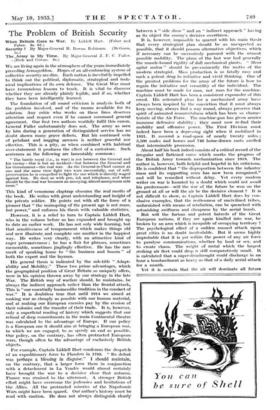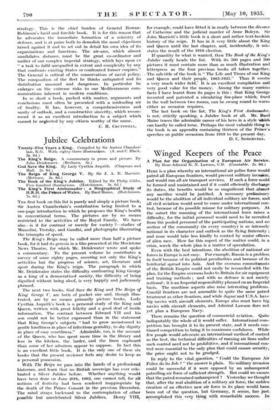The Problem of British Security
The .Army in My Time. By Major-General J. F. C. Fuller. .„ (Rich and Cowan. 6s.)
WE are living again in the atmosphere of the years immediately preceding Armageddon. Hopes of an all-embracing system of collective security are dim. Each nation is inevitably impelled to think out the political, diplomatic, strategical and tech- nical implications of its own defence. The Great War must have tremendous lessons to teach. It is vital .to discover whether they are already plainly legible, and if so, whether they have been intelligently learned.
The foundation of all sound criticism is analysis both of the problem involved, and of the means available for its solution; Any critic who works on these lines deserves attention and respect even if he cannot command general agreement. Our first two authors worthily fulfil this canon. General Fuller unfortunately does not. The army as seen by him during a generation of distinguished service has no doubt shown many grave defects. But his continued vein of petulant and nagging sarcasm is neither graceful nor effective. This is a pity, as when combined with habitual over-statement it produces the effect of a caricature. Such sentences as the following are lamentably common :
"The battle royal (i.e., in war) is not between the General and his enemy--ihis is hilt an incident—but between the General and his Governnient--the real war. As the General-in-Chief cannot at one and the same time fight two wars successfully, out of self- preservation he is compelled to fight the one which is directly waged against him. He does so with pen, ink and telephone, and what should be the real war becomes an annoying, almost anonymoint side issue."
This kind of venomous claptrap obscures the real merits of the book. He writes with great understanding and insight of the private soldier. He points out with all the force of a pioneer that "the mainspring of the present age is not mass, but power," and enforces his thesis with valuable statistics.
However, it is a relief to turn to Captain Liddell Hart, who in the volume before us has expanded and brought up to date an earlier work. He has not only wide learning, but• that sensitiveness of temperament which makes things old and new illustrate. and complete one another in the happiest way. He writes very clearly, with an attractive kind of eager persuasiveness ; he_ has a flair for phrases, sometimes memorable, sometimes jinglingly effective. He has the rare merit of speaking home to "the business and bosom" of both the expert and the layman.
His general thesis is indicated by the sub-title "Adapt- ability and Mobility." These two prime advantages, which the geographical position of Great Britain so uniquely offers, were in his opinion thrown away by our strategy in the late War. The British way of warfare should, he maintains, be always the indirect approach rather than the frontal attack. This is "our essentially businesslike tradition in the conduct of war." It is doubtless true that until 1914 we aimed at making war as cheaply as possible with our human material, and at making our European enemies pay by the cession of their colonies and the transfer of their trade. It is, however, only a superficial reading of history which suggests that our refusal of deep commitments in the main Continental theatre was calculated to the advantage of Europe. If our policy is a European one it should aim at bringing a European war, in which we are engaged, to as speedy an end as possible. Our policy, on :the contrary, has often protracted European wars, though often to the advantage of exclusively British
objects. • For example, Captain Liddell Hart condemns the despatch of an expeditionary force to Flanders in 1793. "Its defeat
was perhaps a blessing in disguise." I should maintain,
on the contrary, that a larger force there in conjunction with a detachment in La Vendee would almost certainly have brought the war to a decisive close that autumn. France was strained to the uttermost. A stronger British effort might have overcome the jealousies and hesitations of the Allies. All the protracted miseries of the Napoleonic Wars might have been spared. Our author's history must be read with caution. He does not always distinguish clearly
between a "side show" and an "indirect approach" having as its object the enemy's decisive overthrow.
It is, however, impossible to quarrel with his main thesis that every strategical plan should be as unexpected as possible, that it should possess alternative objectives, which if necessary can be successively pursued with the utmost possible mobility. The plans of the last war had generally the muscle-bound rigidity Of dull mechanical giants. 31eni agitat molent" should be pre-eminently the motto of the modern strategist. Mass production is so fatally easy and such a potent drug to initiative and vivid thinking. One of the greatest problems for the army of the future is how to regain the initiative and versatility of the individual. The machine must be made for man, not man for the machine. Captain Liddell Hart has been a consistent expounder of this creed. His reiterated pleas for a mechanized army have always been inspired by the conviction that it must always keep moving, always find a way round, always preserve that spirit of animated resourcefulness which has been so charac- teristic Of the Air Force. The machine-gun has given armies immense defensive stability ; they must now re-find their mobility and offensive power. The First Division must indeed have been a depressing sight when it mobilized in 1931. It covered .a road-space of nearly twenty miles ; 5,500 mules and horses and 740 horse-drawn carts swelled that interminable procession.
About half his book indeed consists of a critical record of the irregular and flattened curve which marks the progress of the British Army towards mechanization since 1918. The author is, however, both helpful and hopeful in his criticisms. He is confident that "the disproportion between the infantry mass and its supporting arms has now been recognized," and will be remedied without .delay. Yet every modern writer on war is haunted by a doubt which could net assail his predecessors—will the war of the future be won on the ground at all or will the air be the decisive element ? It is not difficult to show, as Captain Liddell Hart does by con- clusive examples, that the restlessness of uncivilized tribes, unfurnished with means of retaliation, can be quenched with astonishing swiftness and cheapness by the aerial bomb.
But will the furious and potent hatreds of the Great European nations, if they are again kindled into war, be broken by an arm which is incapable of occupying territory ? The psychological effect of a sudden massed attack upon great cities is no doubt incalculable. But it seems highly improbable that it is yet within the power of any air force to paralyse communications, whether by land or sea, and to create chaos. The weight of metal which the largest striking air fleet could drop is still comparatively small. It is calculated that a super-dreadnought could discharge in an hour a bombardment as heavy as that of a daily aerial attack for a month.
Yet it is certain that the air will dominate all future strategy. This is the chief burden of General Rowan- Robinson's lucid and forcible book. It is for this reason that he advocates the immediate formation of a ministry of defence, and is at pains both to demolish the usual objections raised against it and to set out in detail his own idea of its organizations and functions. The air-arm, which almost annihilates distance, must be the great co-ordinator and unifier of our complex imperial strategy, which lays upon us !' a task to fulfil unequalled in extent and complexity by any that confronts existing States or confronted former empires?' The General is critical of the conservatism of naval policy. The composition of the fleet he thinks antiquated and its distribution unsound and dangerous. In particular he enlarges on the extreme risks to our Mediterranean com-
munications inherent in modern conditions. • In so short a book, packed with matter, arguments and conclusions must often be presented with a misleading air of finality. It has, however, a comprehensiveness and sanity of outlook, and a constructive sincerity, which recom- mend it as an excellent introduction to a subject which cannot be neglected by any citizen worthy of the name.
C. R. CiturrwELL.



































































 Previous page
Previous page